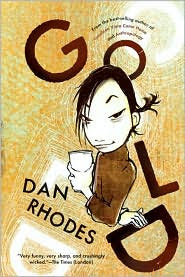The current featured contributor at
Writers Read: Emily St. John Mandel, author of
Last Night in Montreal and
The Singer's Gun.

Her entry begins:
I'm presently reading Something Red, by Jennifer Gilmore. I picked it up partly because it looked really interesting, and partly because Jennifer and I follow one another on Twitter and Facebook. There's a certain obligation when someone you know writes a book—I know a lot of authors at this point, which is frankly kind of an expensive proposition—but as it happens, I love this book so far and I'm glad that I bought it. I'm not very far in, because I got through the first couple of chapters and then I forgot it when I went on tour, but I'm looking...[read on]
Among the
early praise for The Singer's Gun:
"A gripping, thoughtful meditation on work, family, and the consequences of major life choices."
--Booklist
"In this intricate novel, her second after Last Night in Montreal, Mandel underscores the notion that everything in life comes with a price tag, and sometimes that cost is remarkably high. ... An intriguing and suspenseful read that will appeal to those who like mysteries."
--Library Journal
"The Singer's Gun is a nail-biting thriller overflowing with high-stakes issues such as blackmail, theft, fraud and human trafficking. In Mandel's hands, these acts are transmuted into a morally nebulous gray zone, in which the complexities of life fail to be easily captured in terms of  black and white, right and wrong. ... This is a turbulent and diverting read that manages to both entertain and prompt valuable contemplation of its stickier issues."
black and white, right and wrong. ... This is a turbulent and diverting read that manages to both entertain and prompt valuable contemplation of its stickier issues."
--BookPage
... [T]he characters desperately seek and reach for that one true nugget that will transform them from mere husks in the grip of a larger fate into free-standing human beings. Some will, some will not, and whatever answers they wish for will be couched in permanent suspension, never definitive one way or another. The beauty of the novel is that its key truths are those the reader arrives at on his or her own, without the help of a straight-line narrative or a dominating perspective. Instead, Mandel feeds off of our need to make connections, even when the pattern they form doesn't really exist. We start with anxiety and end with it, thrumming in the background for us to listen in -- or ignore, at both cost and reward."
--Sarah Weinman, Los Angeles Times
Emily St. John Mandel was born on the west coast of British Columbia, Canada. She studied dance at The School of Toronto Dance Theatre and lived briefly in Montreal before relocating to New York.
Last Night in Montreal was recently released in paperback.
Last Night in Montreal was a June 2009 Indie Next pick and is a finalist for
ForeWord Magazine's 2009 Book of the Year.
The Singer's Gun, is #1 on the Indie Next List for May 2010.
Learn more about the author and her work at
Emily St. John Mandel's website.
The Page 69 Test: Last Night in Montreal.
Writers Read: Emily St. John Mandel.
--Marshal Zeringue



























